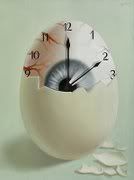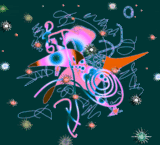
Clothes Make the Man ... Scared
By JANET MASLIN
Published: February 8, 2007
The plot of Joe Hill’s first novel can be summarized simply: An aging heavy-metal star buys a haunted suit over the Internet. He thinks it will be perfect for his ghoulish-artifact collection. The suit agrees, but for all the wrong reasons.
The suit has a mind of its own. It has a ghost of its own too. The ghost would rather go marauding through the rock star’s life than be part of his creepy little museum.
These are the bare bones of “Heart-Shaped Box” — literally, since the ghost is a skeletal old man. But Mr. Hill uses them to shockingly good effect, creating a wild, mesmerizing, perversely witty tale of horror. In a book much too smart to sound like the work of a neophyte, he builds character invitingly and plants an otherworldly surprise around every corner. It would be much easier to compare Mr. Hill’s work to Stephen King’s if Stephen King were not his actual father. (His full name is Joseph Hillstrom King.)
“Heart-Shaped Box,” which takes its title from a Nirvana song, is a Valentine from hell. That’s a thought that would bring a smile to the Goth face of Judas Coyne, the book’s main character. Jude is 54, out to pasture, coasting on the royalties from old albums with names like “Happy Little Lynch Mob” and basically a fraud.
He can watch another band and wonder which member will die first, but this is just macabre habit by now. So is his taste in girlfriends. “It had been years since he dated anyone with a tan,” Mr. Hill writes. “When you were a Goth, it was important to at least imply the possibility you might burst into flames in direct sunlight.” Jude’s taste for the occult has always been “like wearing leather pants, just part of the costume.”) His death-metal paraphernalia (noose, snuff film, cannibal’s cookbook) is an affectation. Has he actively sought out this stuff?
“It seemed to him instead that all these things had been drawn to him like iron filings to a magnet,” Mr. Hill writes, “and he could no more help drawing them and holding on to them than a magnet could.”
As the book begins, Jude is isolated in his Hudson Valley fief, surrounded by the kind of servitude to which he has become accustomed. He has two loyal dogs, a doting personal assistant named Danny and a girlfriend about 30 years his junior. He spends time doing things like restoring old cars, “although why rebuilding a car should feel like honest work instead of a rich man’s hobby, while recording albums and playing arenas had come to seem like a rich man’s hobby instead of a job, he couldn’t have said.” What can be said is that Mr. Hill has the mind-set of the aging rock star down cold.
The suit arrives. And now it’s showtime. At first the suit only scares Jude’s dogs, but soon it has released its ghost and sent him on the prowl. Strange sounds are heard. Jude’s girlfriend is stuck by a pin in the suit and beings showing bizarre symptoms.
The suit — which of course looks like Johnny Cash’s — begins showing up in unexpected places. What separates this haunting from the hollow, arbitrary kind is that Jude has made his living exploiting just this sort of phenomenon. He can’t be sure where reality ends and fantasy begins. Or where retribution begins either.
Mr. Hill has built a revenge plot around the suit, linking it to Jude’s treatment of the old girlfriend he called Florida, because he likes nicknaming groupies for the states from which they came. (Georgia is his current companion.) Florida and Georgia — or Anna and Marybeth, as they turn out to be named — begin to meld together as the story proceeds, even though Anna is dead, with the aid of one hair-raising Ouija board scene.
In his passive way Jude sensed that Anna was in trouble without caring to do much about it. He knew she was “not fashionably depressed, in the way of some Goth chicks, but clinically.” Opinions differ as to whether Jude bears some blame for her suicide.
The ghostly old man is Anna’s stepfather, and he also overlaps with another character: Jude’s father, a monstrous, now-feeble figure who lies near death at Jude’s childhood home in Louisiana. Jude was Justin Cowzynski in those days, but everyone in “Heart-Shaped Box” has picked up an alias of some kind. Everyone in the book is wrestling with some kind of murderous ghost. And everyone is seeking either redemption or revenge.
Mr. Hill, whose British short story collection “20th Century Ghosts” attracted favorable attention (but not an American publisher), has set himself a tricky job here. He balances “Heart-Shaped Box” between reality and fantasy in ways that threaten to run the book into an uncharted dreamscape, and away from the palpable suspense on which it thrives. But he holds the italics to a minimum, pulls back from the brink of hallucinatory overkill and mostly keeps this story tightly on track. Even when it erupts into strange, violent visions — as when, in the midst of a struggle to the death, light pours up from a newly opened door in the floor — this book is so visually intense that its energy never flags.
Though it has the potential to fall back on tricks and pyrotechnics, “Heart-Shaped Box” is firmly rooted in real-world concerns. Mr. Hill elicits honest empathy for Jude, who turned his stage persona into a nightmare version of his fears and must now figure out what strength he has left for legitimate battles. This dynamic is both frightening and funny, and the book weaves together those two threads in clever ways. When Jude slips over into violence, he fights a primal battle but doesn’t worry about petty consequences. “Prison didn’t frighten him especially,” Mr. Hill writes. “He had a lot of fans in there.”











0 comments:
Post a Comment